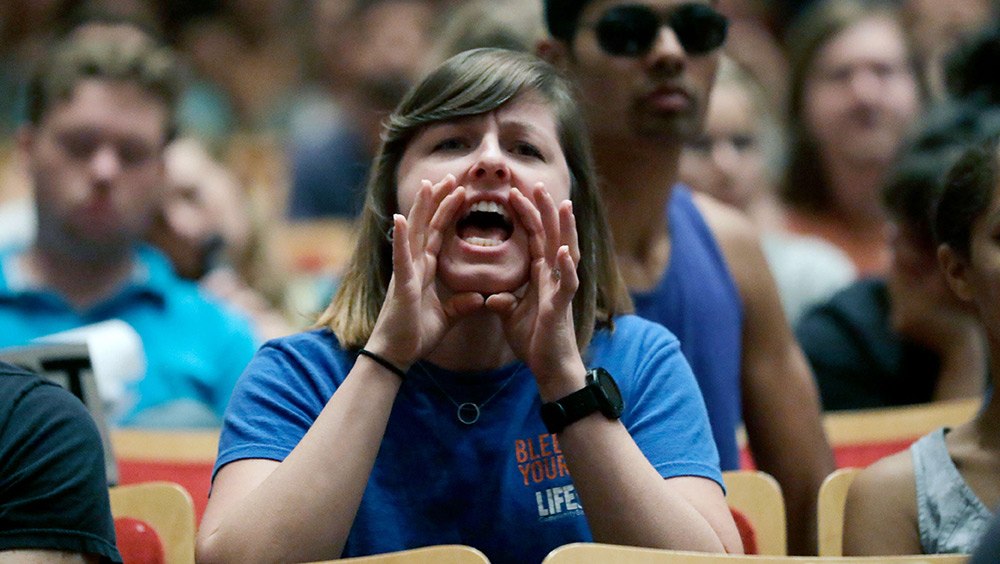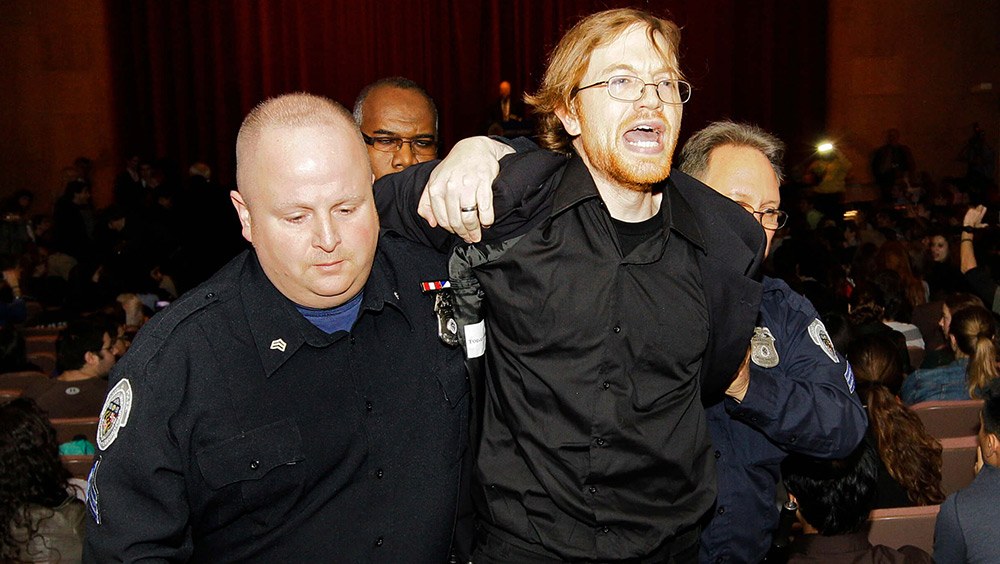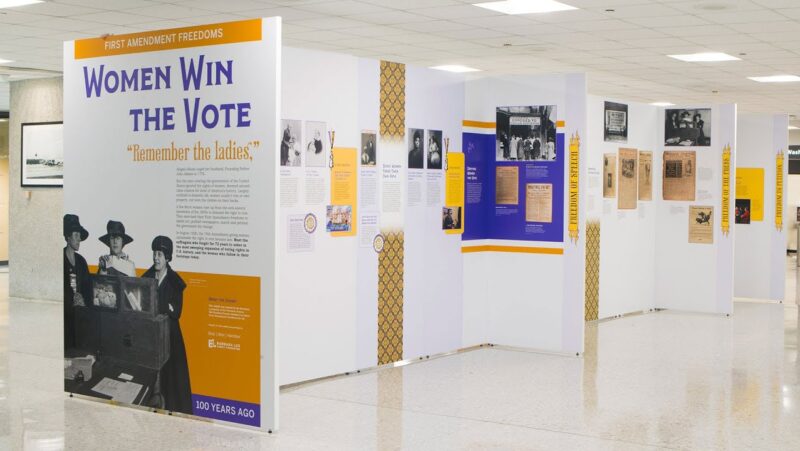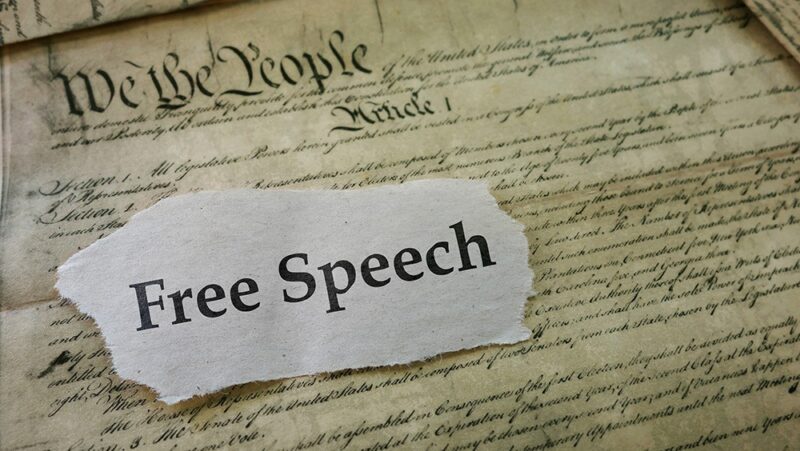Heckler’s Veto: Shouting Down Controversial Speakers

The heckler’s veto is an important concept to freedom of speech. It refers to situations when a speaker is silenced because of the negative, disruptive reaction of others. In other words, a heckler’s veto occurs when the rowdy conduct of a hostile audience shuts down a speaker.
But this violates the First Amendment. Once a speaker has a permit or other permission to speak, he or she cannot be silenced by the government based simply on the crowd’s reaction – unless the speaker intended the crowd to engage in imminent lawless action. And in certain situations an audience that directs its anger toward the speaker must be controlled in order to protect that speaker’s First Amendment rights. When a crowd becomes unruly, the police must take action to ensure the speaker is allowed to continue, including, if necessary, protecting the speaker from the crowd.
Here's everything you need to know about the heckler's veto and how it relates to free speech and the First Amendment.
What is the heckler’s veto?
Let’s unpack the term “heckler.” A heckler attempts to interrupt or shout down a performer. For example, let’s say a comic is telling a joke and a member of the audience starts booing loudly. The loud person who is disrupting the comic is a heckler. If a heckler ends up silencing the speaker, then their conduct has vetoed or overridden the speaker; hence the term “heckler’s veto.”
Free speech scholar Harry Kalven first coined the term, writing in 1965 about various cases involving free speech during the Civil Rights Movement. He noted that if police can silence a speaker when a crowd disapproves and heckles, crowds can use the government to shut down any speaker they disagree with.
The case of Irving Feiner: Court won’t back heckled activist
A classic case of a heckler’s veto occurred in Feiner v. New York (1951). Irving Feiner was a Syracuse University student. Feiner stood on a large wooden box on a street corner using a microphone to address a crowd of about 80 people. Feiner urged African Americans to rise up and fight for equal rights. Two police officers arrived. Some people in the crowd started yelling loudly at Feiner.
Instead of protecting Feiner from the crowd, the police urged Feiner to stop speaking and get off the wooden box. When Feiner refused, they arrested him for disorderly conduct. Feiner argued that he engaged in speech protected by the First Amendment. However, a judge found Feiner guilty. Feiner appealed his case all the way to the U.S. Supreme Court.
The court upheld his conviction by a vote of 6-3. In his majority opinion, Chief Justice Fred Vinson emphasized the ability of the police to maintain peace and order in the streets, writing of Feiner’s “deliberate defiance of the police.”
Justice Hugo Black wrote a fiery dissenting opinion. He said Feiner was punished for his “unpopular views” rather than for his unlawful conduct. Black said the police should have taken all reasonable means to protect Feiner’s right to free speech before telling him to stop. Black warned that “as a practical matter, minority speakers can be silenced in any city.”
Supreme Court rejects heckler’s veto in civil rights case
The U.S. Supreme Court in other cases rejected the application of the heckler’s veto, clarifying that often the reaction of a crowd cannot silence a speaker or protester. Consider Edwards v. South Carolina (1963), a case involving nearly 200 young African American students protesting segregation and other civil rights abuses. They marched from Zion Baptist Church to the statehouse in Columbia, South Carolina. Along the way, they held signs reading “Down with Segregation” and chanted hymns such as “We Shall Overcome.”
When the protesters reached the statehouse, there was a crowd across the way. Many in the crowd did not support the protesters and started shouting. Instead of protecting the peaceful protestors, the police arrested the students and charged them with breach of the peace. Some of the students were sentenced to five days in jail.
The students appealed, but the Supreme Court of South Carolina upheld the convictions. The state Supreme Court said the actions of the arresting police officers “were reasonable and motivated solely by a proper concern for the preservation of order and prevention of further interference with traffic upon the public streets and sidewalks.” The state Supreme Court seemingly did not pay much attention to the fact that the student protestors were engaged in core, First Amendment-protected activity. They were speaking out against abuses, assembling for a greater public good and petitioning the government for a redress of their grievances. In other words, these protestors were exercising their First Amendment rights to freedom of speech, freedom of assembly, and freedom of petition.
The student protestors appealed their case to the U.S. Supreme Court. It was their last resort. The U.S. Supreme Court reversed the convictions on First Amendment grounds. The court explained that the First Amendment “does not permit a State to make criminal the peaceful expression of unpopular views.”
The Supreme Court’s decision in Edwards v. South Carolina was a victory for the First Amendment and the Civil Rights Movement. The court did not allow any negative action by the crowd across the street to serve as a heckler’s veto on these peaceful protesters.
RELATED: 25 Black civil rights activists you need to know
The heckler’s veto on college campuses
In recent years, a type of heckler’s veto has occurred on college and university campuses referred to as the “shout-down.” Students and others upset over a message will shout down the speaker.
When students are so disruptive that they shout down or even attack a speaker, they have crossed the line from protected speech into unprotected conduct.

A heckler is removed by Johns Hopkins University police after he interrupted a speech by Karl Rove, former Deputy Chief of Staff and Senior Policy Advisor to President George W. Bush, in Baltimore in 2011.
While students and faculty have free speech rights at public universities to voice opposition to or criticize a speaker, an invited speaker – even if controversial or offensive to many – also has a free speech right to be heard.
RELATED: Free speech on college campuses: The ultimate guide
Heckler’s veto and the First Amendment
One of the most important principles in First Amendment law is the counter-speech doctrine. It stands for the idea that the best response to harmful or offensive speech is not to censor, silence or try to impose a heckler’s veto on it. But rather, the best response to speech with which you disagree is more speech.
Way back in 1927, Justice Louis Brandeis wrote that the best response was “more speech, not enforced silence.”
As a society committed to freedom and equality, we should avoid the heckler’s veto and ensure greater breathing space for freedom of expression.
David Hudson is a First Amendment fellow with the Freedom Forum.
Watch: Women Win the Vote
18 Freedom of Speech Quotes You Should Know
Related Content

